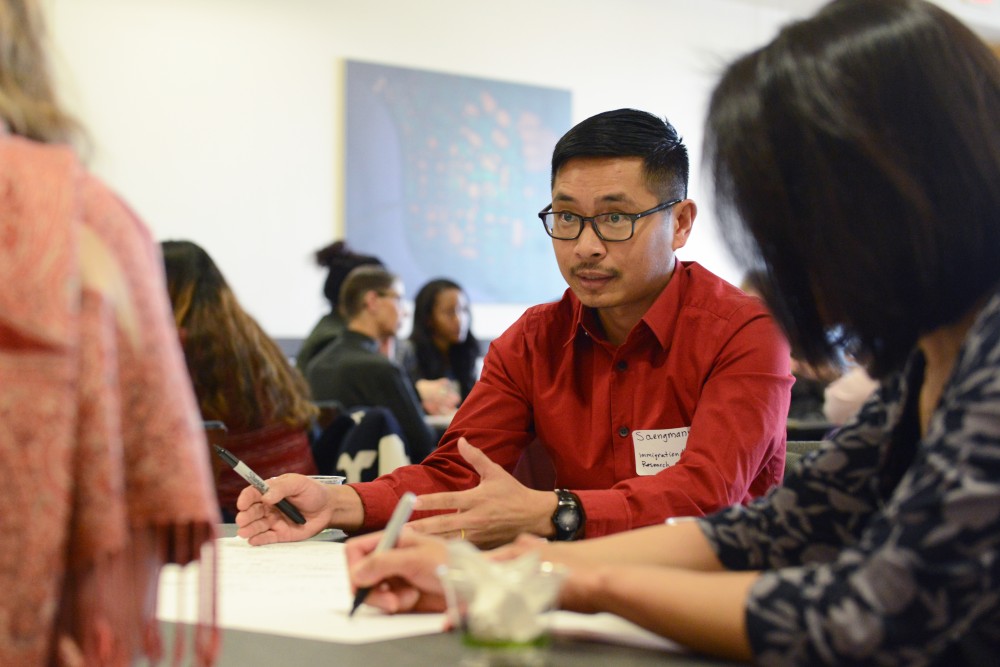Students and faculty say the University of Minnesota’s new Immigration Response Team is a good first step to addressing concerns on campus surrounding President Trump’s immigration policies.
The school announced the group after student governments pushed for President Kaler to declare the school a “sanctuary campus,” which would symbolically support immigrants on campus. Regardless of whether the school declares itself a sanctuary campus — which administrators have made no indication of doing — student-leaders and faculty say the team is an appropriate response.
On Tuesday, the Immigration Response Team held its first event. Leaders crowdsourced ideas on how the group should handle issues like refugee concerns or legal questions.
The event drew about 60 staff, faculty, students and administrators.
Erika Lee, director of the Immigrant History Research Center, said at the event that it’s important for students with questions to have “one central place” for help.
“[Before] no one really knew where to turn to for answers,” she said.
Marissa Hill-Dongre, the group’s director, said the group plans to act as a “first point of contact” for those with immigration issues.
“We want to shape the team based on what the needs are. We don’t want to hire someone for the sake of saying ‘that we have a certain number of people on the team,” she said.
The team came out of high-level administrator meetings, Hill-Dongre said, and the group’s leaders want to rely on feedback from students to further shape the team’s role.
Dongre-Hill said she hopes the team can fulfill perceived student issues and gaps in resources.
“I’ve been aware of the fact there are students who are refugees, immigrants, or undocumented or have DACA status who haven’t felt like they have a place to go with their questions,” she said.
An up-and-down push for sanctuary campus designation
Last November, in the wake of President Trump’s election and campaign promises, Minnesota Student Association President Abeer Syedah started a petition asking to declare the University a “sanctuary campus” that was signed by more than 1,500 people.
Other pushes came in the form of a demonstration at a December Board of Regents meeting and recent student government resolutions by Council of Graduate Students and University Student Senate.
“I think the immigration response team is brilliant and not only responds to what the goals of the sanctuary campus stuff was but a lot of what students have been asking for,” Syedah said.
In January, the Council of Graduate Students passed a resolution asking the University to support immigrants and undocumented students and declare the school a “sanctuary campus.” One of the main requests of the resolution was for the University to provide resources for students, said Nicholas Goldsmith, president of COGS.
“One of those things was providing legal resources, which is exactly what this team is. It’s great to see the University now proactively doing things to help,” he said.
Syedah said she think it’s best for the University to not declare itself a sanctuary campus for funding reasons and federal backlash.
“I think we need to be really smart and really strategic about the decisions we make in order to protect our students. I think it was probably right for [Kaler] to not test these already anxious waters,” she said.
The author of the sanctuary campus resolutions, Elena Gambino, a political science Ph.D candidate, said she is working on moving a resolution through the University Senate, but the response team is a good start.
Gambino said the tradeoff of not using a sanctuary campus designation for campus is minimal.
“What you get for not using the designation, if you are still doing those practices, is not a lot of protection at the end of the day,” she said. “I’m encouraged that even without the designation we have been seeing the same type of commitments.”
Goldsmith said COGS wants to make sure the University follows through with their support for the team.
“Making sure the immigration response team can respond in all situations, if there’s a big uptick … if resources start to get tight, we’ll advocate for more resources in that area,” he said.








